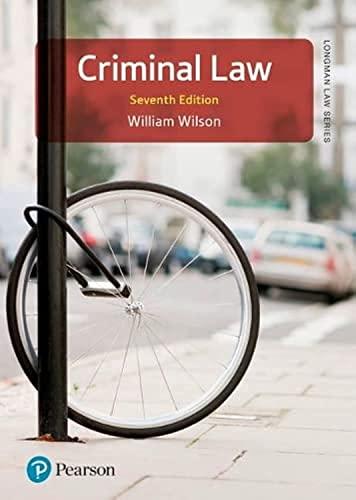Question
Select: (promise ,reasonable bystander ,reasonable person,five, written agreement, stage, sound, important, relied, skill, Oscar, Williams). Rule: Oral representations can be a term if it is
Select:
- (promise ,reasonable bystander ,reasonable person,five, written agreement, stage, sound, important, relied, skill, Oscar, Williams).
Rule: Oral representations can be a term if it is a_______.(promise ,reasonable bystander ,reasonable person,five, written agreement, stage, sound, important, relied, skill, Oscar, Williams). This requires application of the_____ test which asks whether a_____ would regard the oral statements as promises.
Case law: ___chess v ____.
This requires application of____ guidelines:
1) Was the oral statement included in the____?
2) At what____in the negotiations was the statement made?
3) Did the statement_____like a promise?
4) How______is the statement to the parties of the contract?
5) Did one party accept or believe a statement by the other because he or she____on the____or knowledge of that party.
Select:
- ( parole evidence rule,changing, oral, collateral,warranty, three, promissory, inconsistent, written, separate, Savage, Blackney)
Rule: The____presumes that a court will prevent parties from_____or modifying the main contract. An____term may be considered a separate agreement from the main written contact if it is a_____contract or____.
To be a collateral contract, the oral representation must satisfy_____elements.
1. The oral representation must be____in nature
2. The oral representation must not be_____with the main (____) contract. The oral collateral contract must relate to the main contract!
3. The collateral contract must have a____or different consideration to the main contract.
Case laws: JJ____v_____
Select:
- Negligence Rule;
- The reluctance of courts to exempt liability for breaches of fundamental terms;Limitation clause;
- Signature rule;
- Clauses that exclude liability;
- Courts will apply an exemption clause only to events that fall within the four corners of the contract;
- Ambiguity rule;
- Reasonable notice test;
- Constructive notice;
- When the person relying on the term has given direct notice of the represtation;
- Rule that presumes fully written contracts are complete and terms can no longer be changed or added.
Parole Evidence Rule:
If a contract is signed, it indicates the signatory is willing to be bound by the terms, even if it hasn't been read or understood:
Actual notice:
Will occur when the party relying on the term has done that is reasonably necessary to bring it to the attention of a reasonable person:
Test used to incorporate unsigned representations into the contract:
Exclusion clause:
Clause which limit or restricts liability:
Rule that states any ambiguities or uncertainties in the clause will be interpreted against the party seeking to rely on it:
Presumption against fundamental breach:
An exclusion clause will only protect a person guilty of negligence if negligence is specifically mentioned in the exclusion clause:
Four corners rule:
Step by Step Solution
There are 3 Steps involved in it
Step: 1

Get Instant Access to Expert-Tailored Solutions
See step-by-step solutions with expert insights and AI powered tools for academic success
Step: 2

Step: 3

Ace Your Homework with AI
Get the answers you need in no time with our AI-driven, step-by-step assistance
Get Started


